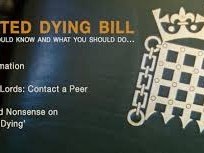Just before the Commons left for the recess the Government published its long awaited bill to regulate lobbying. Sadly it is is deficient in many respects. I criticised it in the pages of PR Week and recently took part in a seminar on transparency in lobbying run by the Committee on Standards in Public Life. See my speech below.
www.prweek.com/uk/news/1192515/Lord-Clement-Jones-predicts-unholy-row-lobbying-legislation/
Lord Clement-Jones predicts ‘unholy row’ over lobbying legislation
Daniel Farey-Jones, prweek.com, Wednesday, 24 July 2013, 9:00am
Liberal Democrat peer and CIPR fellow Lord Clement-Jones has predicted an ‘unholy row’ over the Government’s ‘ludicrous and wrong’ lobbying bill.
Westminster: The Members’ Lobby (Credit: Getty Images)
Clement-Jones, a partner at a law firm that operates a small lobbying practice, att-acked the ‘weak’ bill’s narrow focus on third-party lobbyists’ interaction with ministers and permanent secretaries.
‘It’s ludicrous to limit it to ministers and permanent secretaries,’ he said. ‘I could mount a perfectly respectable campaign without going anywhere near a minister – what about a special adviser, or mid-tier civil servants or somebody who runs a government agency?
‘There’s going to be an unholy row when it comes into Parliament,’ he added. ‘In many ways it would be better not to have a bill than have one at all if it’s going to be weak as this.’
Clement-Jones, who was chair of the government relations practice at healthymanviagra.com DLA Piper from 1999 to 2010, said that the bill left unanswered questions over whether legal firms would have to sign up.
‘We have to have a statutory register otherwise the usual code of conduct that is applied by the solicitors’ regulatory authority, which is that you don’t reveal your clients, is not overridden.’
His comments come as political and constitutional ref-orm minister Chloe Smith insisted the register would cover law firms and management consultancies, but only at the registrar’s discretion.
The commons committee charged with overseeing pol-itical reform has also hit out at the bill, saying the Government had ‘shown a lack of res-pect for Parliament’ in its rush to publish the draft bill.
The Political and Constitutional Reform Committee pledged to focus on influencing MPs’ responses to the lobbying bill after it was denied scrutiny of draft legislation.
Speech to Committee on Standards in Public Life on September the 19th
It seems rather strange for me to be starting the batting today but I suppose that the reason doing so is because I have worked on both sides of the street both having been lobbied and having run a government relations operation.
I’ve been as a Liberal Democrat working peer in the House of Lords since 1998 and during the 80s and 90s I was a lobbyist and lawyer for business and then in a law firm and the chairman of their global government relations practice.
An important experience for me was the lobbying individual MPs in the course trying to get Sunday Trading Reform. This was an example of where an individual MP with a free vote has a considerable influence as opposed to the normal circumstance where it is the Government which is looking to make a decision
I must say that I agree with 99.9% of the Political and Constitutional Affairs Committee’s recent report, which came out on 5 September, in its critique of the new Bill.
I won’t repeat the contents of that but suffice it to say that as regards the definition of a consultant lobbyist, the scope of the officials involved and and the de minis provisions which exclude certain firms the Bill seems to me to be misguided.
In terms of scope of officials involved we need to look at how lobbying works in the UK. In a hierarchical society we may well need to go to the top.
In the UK lobbyists often make the case to junior officials first and work their way up through the food chain. We should include in the definition of lobbyists therefore those who lobby not just senior civil servants but mid level officials. Special advisers should be specifically included too.
Generally I believe that the enforcement of the various professional codes of conduct is far more important than registration and the declaration of clients.
I should declare a slight conflict here because of the unique position of solicitors who are governed by a strict code of conduct imposed by the Solicitors Regulatory Authority. This provides that solicitors cannot disclose clients identity without their consent.
They never know whether a client will give permission in the future.So a statutory override through legislation is required by solicitors to be able to sign up to codes such as that of the APPC which require disclosure of clients.
Generally I believe that the lobbied are more important than the lobbyist. It is far more important that there is transparency by public officials and by members of the legislature including the Lords than lobbyists declaring who they act for.
The key is who among decision-makers and opinion formers should declare and what they should declare i.e. what ever codes say there should be a further transparency for members of the Executive such as ministers, civil servants and special advisers.
Surely now it is feasible for them to make a regular declarations. Quarterly is not enough especially now with the new Gov.uk website which could aggregate the information.
It is very important that declarations by members of the executive should give detail as to the nature of the meetings. For instance if civil servants meet the CEO of a holding company it will not be always clear which particular aspect of the business has been discussed
For the legislature there are slightly different considerations and it is important that on non constituency matters MPs should declare who they have been lobbied by. Likewise in the Lords peers should declare who they have been lobbied by for the purposes of influencing legislation.
I don’t believe that this should be as frequently as for the Executive but six monthly would certainly be in order.
So a set of flawed proposals which don’t address the real issues. If the Bill had undergone pre-legislative scrutiny- essential in circumstances where constitutional issues are involved-I really do believe we would have had a much better debate about what really does constitute a proper level of transparency.
29th January 2018
Lord C-J Calls for Action on Museum Finance
18th July 2015
Lord C-J debates the future of the BBC
14th December 2014
Why I am against the Assisted Dying Bill
1st December 2014






